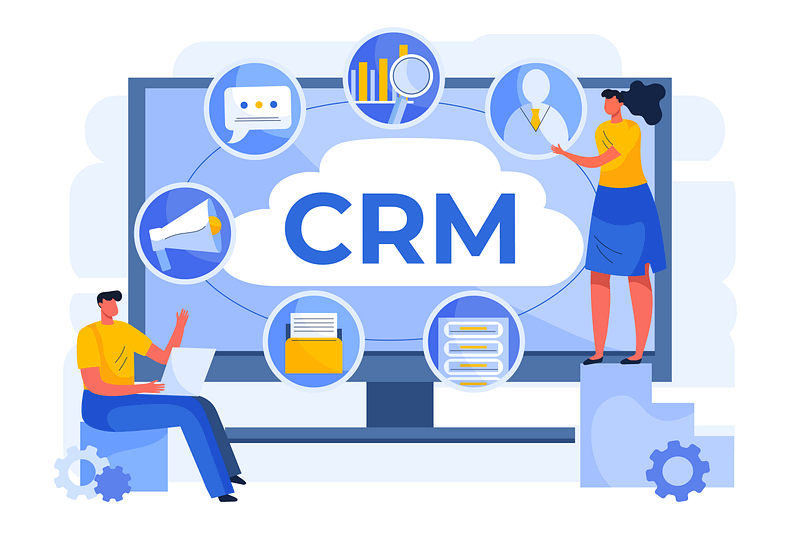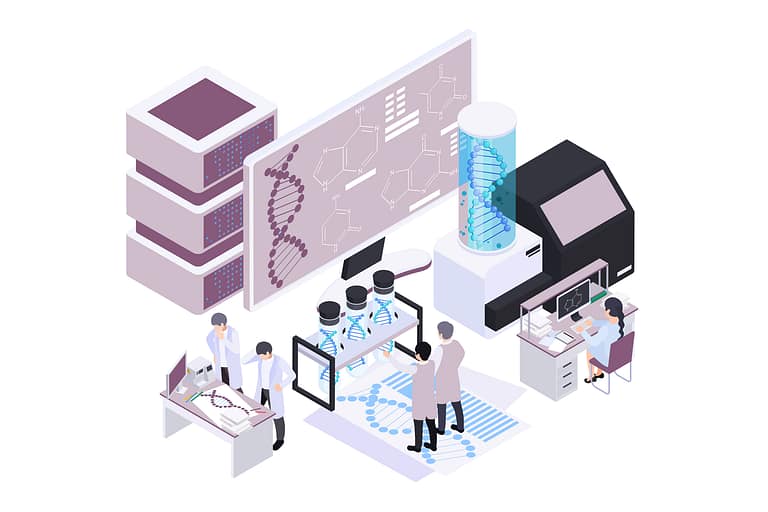Nel mondo degli affari di oggi, dove la competizione è sempre più serrata e le aspettative dei clienti sono in continua evoluzione, l’aumento della produttività è diventato una priorità assoluta per le aziende di ogni dimensione e settore.
Oltre a cercare prodotti di alta qualità e servizi efficienti, i clienti desiderano esperienze estremamente personalizzate. Vogliono sentirsi unici e riconosciuti come individui, non solo come consumatori anonimi. Inoltre, si aspettano di poter interagire con i brand su qualsiasi canale di comunicazione, sia esso online o offline, e in qualsiasi momento della giornata. Questo significa che le aziende devono essere sempre disponibili e pronte a rispondere alle esigenze dei clienti, fornendo risposte rapide e soluzioni immediate ai loro problemi.
Negli ultimi anni il mercato si è orientato verso un approccio customer-centric, dove il cliente è al centro di tutto. Non è più sufficiente offrire un buon prodotto o servizio; è fondamentale costruire relazioni significative con i clienti e offrire esperienze personalizzate che rispecchino le loro esigenze e preferenze individuali. Le aziende che riescono a mettere il cliente al centro delle proprie strategie sono destinate a distinguersi e a prosperare in un mercato sempre più competitivo e orientato al consumatore.
In questo contesto, l’implementazione di un Customer Relationship Management (CRM) può essere uno strumento fondamentale per il successo aziendale. Vediamo come un CRM può contribuire ad aumentare la produttività e migliorare le prestazioni complessive dell’azienda.
Cos'è un CRM e come funziona?
Un CRM è un sistema software progettato per gestire le interazioni con i clienti, comprese le attività di vendita, marketing e assistenza clienti. L’obiettivo principale di un CRM è quello di centralizzare e organizzare i dati dei clienti, consentendo alle aziende di tracciare e gestire le relazioni con i clienti in modo più efficace.
Vediamo nel dettaglio quali sono i vantaggi offerti da un CRM.
Aumento dell’efficienza operativa
Un CRM aiuta a migliorare l’efficienza operativa automatizzando processi manuali e ripetitivi. Ad esempio, si possono automatizzare le attività manuali e di routine, come l’invio di email di follow-up personalizzate che favoriscano la fidelizzazione, la creazione di report automatici o l’assegnazione automatica dei compiti, consentendo ai team di concentrarsi su attività di valore aggiunto, anziché su compiti amministrativi.
La distribuzione automatica delle attività da svolgere garantisce che ogni compito venga assegnato al membro del team più adatto a gestirlo, in base alle competenze, alla disponibilità e alla priorità del compito stesso. Ciò permette di ottimizzare le risorse umane e di garantire che le attività vengano completate in modo tempestivo ed efficiente, contribuendo così a migliorare complessivamente l’efficienza operativa dell’azienda.
Inoltre, l’automazione delle attività di routine permette alla forza vendita di dedicarsi a compiti più edificanti e gratificanti, aumentando la soddisfazione sul lavoro e, di conseguenza, la produttività complessiva dell’organizzazione.
Miglior gestione delle relazioni con i clienti
Attraverso un sistema CRM, le informazioni sui clienti diventano facilmente accessibili e vengono aggiornate in tempo reale. Questo consente ai team di vendita e di assistenza clienti di fornire un servizio più personalizzato e tempestivo, migliorando la soddisfazione del cliente e rafforzando le relazioni commerciali.
Con un CRM ben implementato, le aziende possono trarre vantaggio dalle opportunità di upselling e cross-selling, identificando facilmente le necessità e le preferenze dei clienti e suggerendo prodotti o servizi complementari. Questo approccio non solo aumenta le entrate, ma rafforza anche il rapporto con il cliente, dimostrando attenzione e interesse per le loro esigenze.
Inoltre, un CRM è un potente strumento per fornire assistenza clienti di alta qualità. Consentendo di registrare, monitorare e risolvere le richieste dei clienti in modo efficiente, il CRM migliora l’esperienza complessiva del cliente e favorisce la fidelizzazione.
Per rendere ancora più efficace l’assistenza clienti, molte aziende stanno adottando chatbot integrati nel loro CRM. I chatbot possono rispondere istantaneamente alle domande frequenti dei clienti, fornire informazioni sui prodotti o servizi e indirizzare le richieste agli operatori umani quando necessario. Inoltre, è possibile creare scenari predefiniti per garantire risposte coerenti e accurate anche in assenza di operatori umani, migliorando l’efficienza e la soddisfazione del cliente.
Analisi approfondite e decisioni migliori
Oltre a gestire i contatti e le vendite, un CRM offre un’enorme ricchezza di dati che possono essere sfruttati per migliorare la strategia commerciale complessiva dell’azienda. Utilizzando gli strumenti di analisi integrati nel CRM, è possibile esaminare i dati dei clienti per individuare tendenze, modelli di comportamento e esigenze non soddisfatte.
Questi dati possono rivelare informazioni preziose su quali prodotti o servizi stiano avendo successo e quali potrebbero necessitare di miglioramenti o adattamenti. Utilizzando i dati raccolti dal CRM, è possibile sviluppare nuove offerte mirate da proporre ai segmenti di pubblico giusti. Questo approccio basato sui dati consente di adattare le offerte alle esigenze specifiche dei clienti, aumentando le probabilità di successo e migliorando la soddisfazione complessiva del cliente.
Sfruttando appieno il potenziale dei dati del CRM, le aziende possono migliorare la loro strategia commerciale e ottenere un vantaggio competitivo significativo sul mercato.
Consigli pratici
Ecco alcuni consigli pratici per utilizzare il CRM in modo efficiente e massimizzare il potenziale della tua azienda:
Assicurati che tutti i dati siano aggiornati e di qualità: Mantieni un database pulito e aggiornato, eliminando i dati duplicati o obsoleti e assicurandoti che tutte le informazioni siano corrette e complete. In questo modo, potrai prendere decisioni più informate e fornire un servizio migliore ai tuoi clienti.
Standardizza i processi: Definisci processi chiari e standardizzati per l’uso del CRM, in modo che tutti i membri del team siano a conoscenza di come utilizzare il sistema in modo coerente. Questo aumenterà l’efficienza nello svolgimento delle attività quotidiane.
Centralizza le informazioni: Utilizza il CRM come un’unica fonte centralizzata di informazioni sui clienti e sulle attività aziendali. Questo eviterà la dispersione di dati su più piattaforme.
Definisci compiti e ruoli chiari: Assicurati che ogni membro del team abbia compiti e responsabilità ben definiti all’interno del CRM. Definisci chiaramente i ruoli e le aspettative per ogni persona coinvolta nell’utilizzo del sistema.
Forma il personale: Assicurati che tutti i membri del team siano adeguatamente formati sull’uso del CRM e ne comprendano i benefici. Assicura sessioni di formazione regolari e supporto continuo per garantire che tutti siano in grado di utilizzare il sistema in modo efficace.
Sfrutta le funzionalità di automazione: Utilizza le funzionalità di automazione del CRM per semplificare i processi e ridurre il carico di lavoro manuale. Ad esempio, automatizza l’invio di email di follow-up o la creazione di promemoria per garantire che nessuna attività importante venga trascurata.
Monitora e misura le performance: Utilizza i report e le analisi fornite dal CRM per monitorare le performance del team e identificare eventuali aree di miglioramento. Utilizza queste informazioni per apportare aggiustamenti ai processi e ottimizzare le strategie di vendita e marketing.
Integrazione con altre piattaforme: Assicurati che il tuo CRM sia integrato con altre piattaforme e strumenti utilizzati dalla tua azienda, come email, calendari e sistemi di gestione delle vendite. Questo garantirà un flusso di lavoro senza soluzione di continuità e una maggiore efficienza complessiva.
Massimizzare la Produttività Aziendale con Odoo CRM
DueEsseTi propone Odoo CRM, una soluzione in cloud completa, scalabile e altamente personalizzabile che può aiutare le aziende a ottimizzare le loro operazioni e a massimizzare la produttività.
La soluzione CRM di Odoo è una suite completa che include: gestione contatti, calendario, CRM, sms marketing, email marketing, social marketing e marketing automation. È inoltre integrabile con gli altri moduli della piattaforma Odoo.



